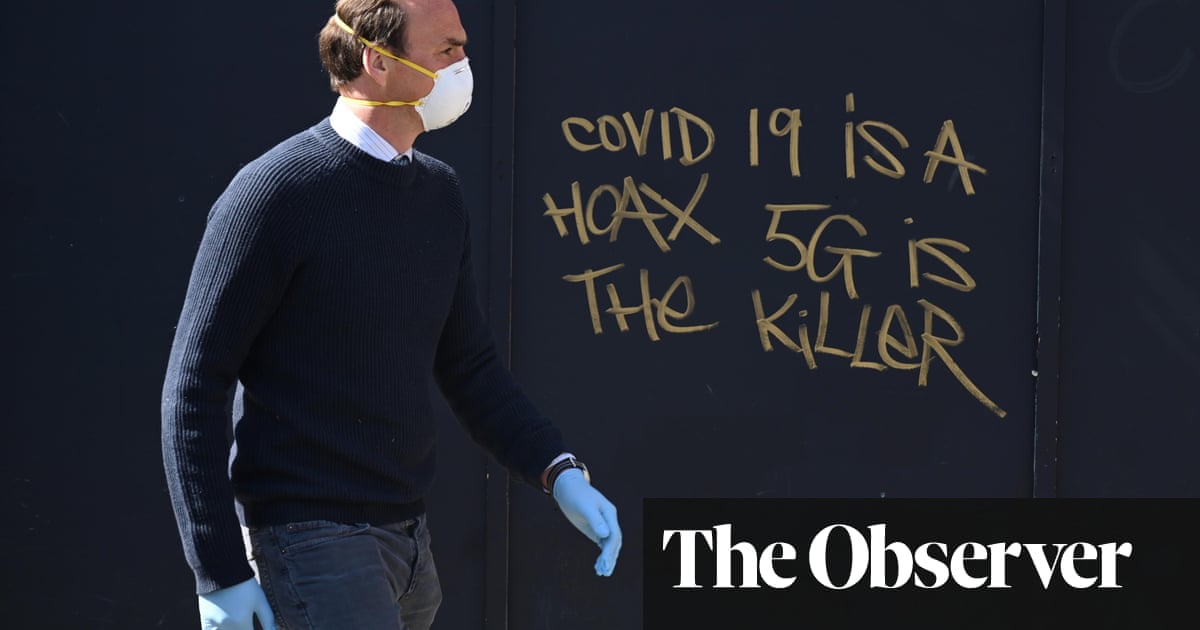The attacks on phone masts and the spreading of anti-vaxx conspiracies are all part of the same strain of misinformation. But is evidence-based reality going to make a comeback?

There have not been too many encouraging graph lines in recent weeks. One that does offer a breath of optimism, however, is the slight downward curve that implies one of the most toxic trends of our times the anti-vaxx movement might just be in retreat. The shift is incremental, but in a UK-wide survey in mid-March, 7% of people insisted they would refuse to have a coronavirus vaccine if one were available. By early April, with hospital wards and mortuaries filling up, that number had dropped to 5%. Perhaps vaccine conspiracy cannot bear too much pandemic reality.
As with the strategies against the virus itself, however, the response to any likely cure seems likely to vary from country to country. A similar survey in France, also conducted by the London-based Vaccine Confidence Project, suggested 18% of people would refuse a vaccine, while in a poll in New York, the city worst affected by the pandemic, 29% insisted they would not consent, a number that may render any programme ineffective.
The depth of misplaced fear about vaccination which remains one of the unambiguous triumphs of global public health has been further illustrated in widely shared remarks from lockdown. Novak Djokovic last week volunteered that he would have to think seriously about whether he could even carry on playing tennis if a vaccine were to become mandatory to travel. The rapper MIA went further in informing her 650,000 Twitter followers melodramatically, that if I have to choose the vaccine or a [location-tracking] chip, Im gonna choose death.
The most prominent American anti-vaxxer, Robert Kennedy Jr, meanwhile, amplified an unhinged conspiracy that believes Bill Gates is using the virus as part of a supposed plot to control the worlds population through immunisation.
All pandemics trail a ready market in superstition, quackery and prejudice a sense of powerlessness generates in some the need for catch-all theories, however deranged. At the time of the great plague in London, the spread of miracle cures and scapegoating prophecy was almost harder to contain than the infection itself. As part of its strategy the government was moved, Daniel Defoe reported in his A Journal of the Plague Year, to suppress the printing of such Books and Pamphlets as terrify the People. The efforts to prevent the spread of damaging conspiracies across our own media have shared a similar profile and often a similar success rate to the efforts to curb the disease.
In this respect, the pandemic is something of a test case for the social media monopolies of Silicon Valley to deliver on their widely trumpeted commitment to slow the spread of dangerously false information. After being confronted with the evidence of manipulation in the elections of 2016, and the spread of such vile conspiracies as that which argued that the Sandy Hook massacre was a hoax, Facebook and Google and the rest have been forced to step up efforts to monitor and block extreme misinformation campaigns on their various platforms. Arguably, that effort is finally starting to show some effect.
Counterintuitively, some evidence for that might be found in the response to the most pernicious of the current conspiracies which has, entirely without scientific foundation, sought to link the spread of coronavirus with the rollout of the 5G data network. The real-world effects have been the acts of vandalism and arson against mobile phone masts in the past weeks. Up to 50 such attacks have been reported, mostly on Merseyside and in the West Midlands, including the burning of the 5G mast adjacent to the new Nightingale hospital outside Birmingham.

A report from the independent verification charity Full Fact last week revealed how this copycat campaign was only the most dramatic expression of a conspiracy theory with different strains, which include that all the symptoms [of the virus] are actually caused by 5G [and] that there is no disease at all, and the outbreak is a gigantic hoax to enable the government to install 5G under the cover of lockdown. It should go without saying that there is no possible connection between the 5G radio waves and the spread of a virus. Even so, the government was forced to address the fears, calling them dangerous nonsense.
Thinking about contagious ideas now, I recall interviewing Daniel Dennett, the philosopher of evolution, back in 2006, just before the launch of Twitter. Dennett was talking excitedly of a word that he and Richard Dawkins had coined to describe how Darwinist idea-germs could be sent into battle against the politicised viruses of creationism. He called these idea-germs memes. Nah, I thought at the time; it will never catch on.
In the 14 years since, it has become second nature to trace the originators of particularly incendiary memes. A story in Wired magazine located the origin of the 5G conspiracy in an interview of 22 January in a Belgian newspaper with Kris Van Kerckhoven, a general practitioner from Putte, near Antwerp. He was quoted as saying that 5G is life-threatening, but then added a speculative comment (I have not done a fact-check) that linked that falsehood to the virus then confined to China. The link became an ill-advised clickbait headline. (The piece, in Het Laatste Nieuws, was subsequently withdrawn.)
If these words marked the moment when the 5G conspiracy established its RNA, however, the wet market for those ideas to jump species and spread human to human was a conference given on 11 March at the Health and Human Rights Summit, in Tucson, Arizona. The headline act was the original anti-vaxxer Andrew Wakefield, the discredited English doctor, who was struck off by the GMC after being shown to have deliberately falsified evidence to make bogus claims of a link between the MMR vaccine and autism. Wakefield was in this case upstaged by a Californian, Thomas Cowan, author of Cancer and the New Biology of Water, who is serving a five-year suspension from medical practice for prescribing unlicensed drugs to cancer patients. Cowan claimed, entirely falsely, that Covid-19 was caused by electromagnetic waves and, also incorrectly, that Wuhan, where it originated, had been the guinea-pig city for 5G.
Videos of this talk were viewed 1.8 million times on YouTube and widely shared on Facebook before the sites moved to take the posts down.
In their book A Lot of People Are Saying, their study of conspiracism in the Trump era, Russell Muirhead and Nancy Rosenblum classify people such as Cowan as conspiracy entrepreneurs. Once he had seeded his conspiracy virus, multiple other wilder mutations followed, some linking it to an Illuminati plot, others to the blood sacrifice of Kobe Bryant in a helicopter crash.
In Britain, some of those contagious fantasies found a population in which they could move as easily as coronavirus among Cheltenham Festival racegoers. Their combination with media attention around the decision to allow Huawei to supply some of the UKs 5G infrastructure, and the fact that telecoms engineers were designated key workers, appears to have ignited dangerous lockdown fears. Challenges were laid down in Facebook groups and Reddit threads for firestarters to take the 5G out.
Social media platforms, fearing sanction, took long overdue action. Facebook has accepted a responsibility to remove false claims that 5G technology causes Covid-19, while promising a modification that will direct people who look for such content toward accurate information from the NHS and the WHO.
Some of the belated efforts to police alt-right conspiracy content in the past couple of years are also helping to contain the spread of the madness. There has been no more virulent conspiracy entrepreneur than Alex Jones and his web channel, InfoWars. Jones has predictably loud-hailered the 5G and anti-vaxx lines: This is the plan, folks, he grunted at his viewers. They plan if theyve fluoridated you and vaccinated you and stunned you and mesmerized you with the TV and put you in a trance on killing you. Meanwhile, they were determined to make sure you dont learn about the known antivirals. Prominent among these, apparently, were Joness own wellness products: SuperSilver Whitening Toothpaste and ABL Nano Silver Gargle which, he claimed, kills the sars-corona family at point-blank range. (The only scientifically proven effect of the active ingredient in these products, colloidal silver, is that it turns your skin blue.)
Up until last year Joness vicious untruths would have been spread by millions of followers on YouTube and Facebook and Twitter. However, with trials pending involving the bereaved Sandy Hook parents he repeatedly called actors, his platforms were finally shut down for hate speech.

Having curtailed some of the spread of the most noxious threads, social media platforms apparently hope to rely, at least a little, on herd immunity to contain the conspiracy. When celebrity super-spreaders of the 5G claims have emerged in recent weeks including the actor Woody Harrelson, the boxer Amir Khan and the breakfast show host Eamonn Holmes they have the experienced the chill of immediate social media isolation and distancing.
It is still early days in this ongoing battle between fact and fantasy, but perhaps the general global compliance with lockdown measures, and the increasing appetite for verifiable facts and figures, indicates that rational voices might yet be in the ascendancy.
Even those on the frontline of protest against distancing measures in the southern American states have looked conspicuously conflicted. Several have marched under coronahoax banners while wearing face masks, hedging bets. Perhaps they have listened to the snake-oil hunches and tantrums of their president while the bodies pile up, and wondered. Perhaps they fear, privately, the tragic irony in the story of John McDaniel, 60, of Ohio, who spent March posting conspiracy Does Anybody Have The Guts to Say This Covid-19 is a Political Ploy? Asking For A Friend. Prove Me Wrong before, last week, becoming the first person in his county to die from the disease.
History shows that pandemics change things in surprising ways. Much has been made of the superstition that has attended other epidemics, but they have also generated great advances in public health, including vaccination; even the wildest conspiracy entrepreneur probably knows deep down that the only way out of the current tragedy is careful application of the scientific method.
In the past few weeks we have been exposed to a reality that all human generations before ours and many millions in our own times in less advantaged parts of the planet have known as a fact of life: that we exist in a precarious world of rapidly transmitted infectious diseases without an obvious cure. Though the sight of mass graves being dug and economies floundering has caused some to double-down on their pet grievances, to set fire to phone masts and indulge their fantasies about the Illuminati, it may yet cause more to think about getting back in touch with reality.
Read more: https://www.theguardian.com/world/2020/apr/26/5g-coronavirus-and-contagious-superstition


Recent Comments